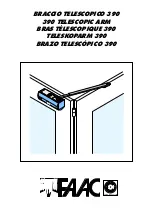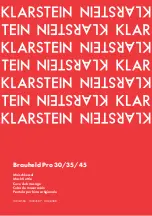
19
E1: encoder.
Permits adjustment of the parameter selected on the graph G1.
The value is shown on the display D1.
S1: current regulation system key.
Selects the welding current regulation system:
from front panel in “internal” mode
from remote control in “external” mode
(in this case via E1 it is possible to enter the maximum
current value that can be selected via the remote control).
S2: key for selecting type of TIG welding current.
CONSTANT current with or without SLOPES
PULSED current with or without SLOPES
MEDIUM FREQUENCY current with or without SLOPES
Switch-on of the led at the side of the symbol confirms the
selection.
S3: key for selecting control mode in TIG.
2-stroke welding (2T)
4-stroke welding (4T)
2-level welding (BILEVEL)
Switch-on of the led at the side of the symbol confirms the
selection.
In
2-stroke
, when the button is pressed the gas flows and the
arc is struck; when the button is released, the current goes to
zero in the slope-down time; once the arc is off, the gas flows
for the post-gas time.
In
4-stroke
, the first time the button is pressed the gas flows for
the manual pre-gas time; when the button is released, the arc is
struck. If the button is pressed again and definitively released,
the current slope-down and post-gas time begin.
In
BILEVEL
the welder can weld with 2 different currents pre-
viously set via
S5
.
The first time the torch button is pressed, the pre-gas time is run,
the arc is struck and welding is performed with the initial current.
The first time it is released, slope-up to current “
I1
” occurs. If
the welder presses and quickly releases the button, the machi-
ne will go to “
I2
”; by pressing and quickly releasing the button
it returns to “
I1
” and so on.
If the button is pressed for longer, the current slope-down
begins which leads to the final current.
When the button is released the arc goes out while the gas con-
tinues to flow for the post-gas time.
S4: welding procedure selection key.
Permits selection of the welding procedure.
Switch-on of the led at the side of the symbol confirms the
selection.
Procedures:
MMA (electrode)
TIG LIFT-ARC start
TIG HIGH FREQUENCY start
S5: set-up / parameters key.
Gives access to set-up and selection of the welding parameters
on the graph G1.
G1: welding parameters.
The graph shown on the panel permits selection and adjustment
of the welding parameters.
Switch-on of the led confirms the selection.
Tu
Slope-up: allows you to set a gradual passage between the
initial current and the welding current. Parameter set in
seconds (s).
Minimum off, Max 10s, Default off
I
Welding current: permits adjustment of the welding current.
Parameter set in Amps (A).
Minimum 6A, Max 240A, Default 100A
Ib
Base current: permits adjustment of the base current in pul-
sed and fast pulse modes.
Parameter set in Amps (A).
Minimum 6A, Max 240A, Default 6A
Tp Peak time: permits adjustment of the time the current is
maintained at high level in pulsed mode.
Parameter set in seconds (s).
Minimum 0.02s, Max 2s, Default 0.24s
Tb Base time: permits adjustment of the time the current is
maintained at low level in pulsed mode.
Parameter set in seconds (s).
Minimum 0.02s, Max 2s, Default 0.24s
When in MEDIUM FREQUENCY operation, the
leds Tp and Tb come on simultaneously and the
pulse frequency value appears on the display D1.
Tp/Tb Frequency: permits adjustment of the pulse frequency in
fast pulse mode.
Parameter set in Hertz (Hz).
Minimum 20Hz, Max 500Hz, Default 100Hz
Td Slope-down: allows you to set a gradual passage between
the welding current and the final current.
Parameter set in seconds (s).
Minimum off, Max 10s, Default off
If
Final current: permits adjustment of the final current.
Parameter set in Amps (A).
Minimum 6A, Max 240A, Default 8A
Pg Post gas: permits adjustment of the gas flow at the end of
welding.
Parameter set in seconds (s).
Minimum off, Max 25s, Default 5s
I2
Bilevel current: permits adjustment of the secondary cur-
rent in the bilevel welding mode.
Parameter set in Amps (A).
Minimum 6A, Max 240A, Default 50A
J1: 7-pole military standard connector.
For connection of the remote controls RC16 and RC12.
















































